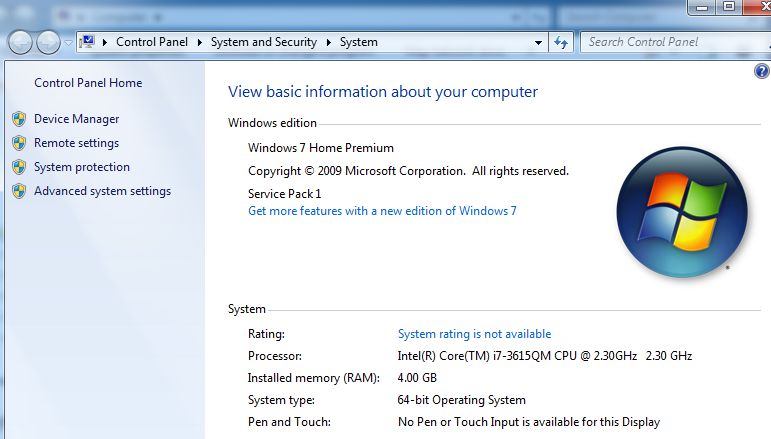

You can also save this output to a file by simply redirecting the output. For example, you can output the data in ‘JSON’ format using the option '-J'. This command has some useful options as well. Command lscpuįirst, let us check out the simple command ‘lscpu’ which prints the information in a neat and more readable format. Apart from reading this file, there are few inbuilt commands which you can run to get the CPU information. This will output the contents on the command line, and you can press ‘Enter’ to scroll down. You can also view the contents of this file directly on the command line by running: $ less /proc/cpuinfo $ vim /proc/cpuinfoĪs you can see in the screenshot above, all the information like the model name, speed, cache size, is present in the file. Open the file /proc/cpuinfo using a text editor of your choice. In Linux, CPU information is stored in a system file, which can be either read using a text editor, or it can be read and used in an administrative shell script. You can run cpufreq-info to understand easily.The CPU Information in any machine includes information about the processor, the vendor details, model name, architecture, speed of processing, etc.

Here cpu MHz means current cpu frequency. Model name : Intel(R) Core(TM) i7-4500U CPU 1.80GHzįlags : fpu vme de pse tsc msr pae mce cx8 apic sep mtrr pge mca cmov pat pse36 clflush dts acpi mmx fxsr sse sse2 ss ht tm pbe syscall nx pdpe1gb rdtscp lm constant_tsc arch_perfmon pebs bts rep_good nopl xtopology nonstop_tsc aperfmperf eagerfpu pni pclmulqdq dtes64 monitor ds_cpl vmx est tm2 ssse3 fma cx16 xtpr pdcm pcid sse4_1 sse4_2 movbe popcnt tsc_deadline_timer aes xsave avx f16c rdrand lahf_lm abm ida arat epb xsaveopt pln pts dtherm tpr_shadow vnmi flexpriority ept vpid fsgsbase tsc_adjust bmi1 avx2 smep bmi2 erms invpcidĪddress sizes : 39 bits physical, 48 bits virtual

Sample output of cat /proc/cpuinfo processor : 0
#CPUINFO COMMANDLINE CODE#
The relevant code for the CPU section is: $$uptime This sits on the right of my built-in display all the time. My favourite is to use Conky where you can paint your own picture: However you can get the same results without sudo using: cat /sys/devices/system/cpu/cpu*/cpufreq/scaling_cur_freq I'd like to point out sudo is needed for Ian's answer above: sudo cat /sys/devices/system/cpu/cpu*/cpufreq/cpuinfo_cur_freq Lastly do note that dmidecode reads information from the ACPI tables which is not always the same as the real time ones done by the other tools. you CAN compare the maximum because that should show the same for any of the ways you can analyze the CPU, but the current will always be literally "the current CPU hertz" at the moment you execute it. Note: All the commands above will also give you the CURRENT cpu Hertz, meaning, if you expect to see the same one on lscpu and when doing the cat /proc/cpuinfo it will be near impossible. I am fairly certain there are other ways, just don't remember right now. Will not work in some cases, that is why I posted the dmesg one first.Īnd that's all I can remember from the top of my head. You can also target the current MHz detected by the kernel by querying the log files:Ĭat /var/log/dmesg | grep "MHz processor" - For the current detected MHz speedĬat /var/log/kern.log | grep "MHz processor" - For the current and past detected MHz speeds. Out of all of this, lshw and dmidecode provide the best information out of your CPU. $ sudo dmidecode -t processor | grep Speed Sudo dmidecode -t processor or more precise: sudo dmidecode -t processor | grep "Speed" Will not only give you a MHz in use but also the Maximum you can push / overclock your CPU to. WARNING: output may be incomplete or inaccurate, you should run this program as super-user. WARNING: you should run this program as super-user. Lshw -c cpu or more precise version: lshw -c cpu | grep capacity

So if you have an Core 2 Duo, AMD Bulldozer, Core i7, etc. This will give you the individual MHz for each CPU Core. $ lscpu | grep "MHz".Ĭat /proc/cpuinfo or more precise cat /proc/cpuinfo | grep "MHz". This will give you the general MHz for the CPU. Lscpu or more precise lscpu | grep "MHz".


 0 kommentar(er)
0 kommentar(er)
